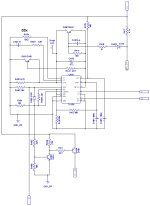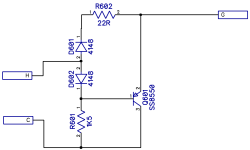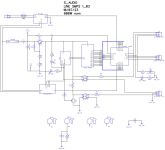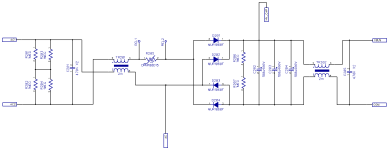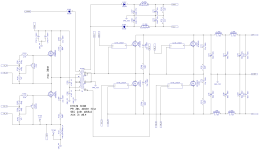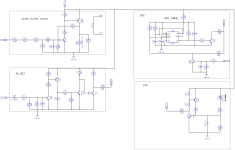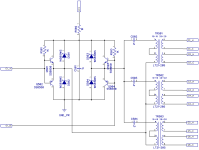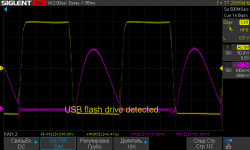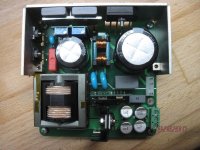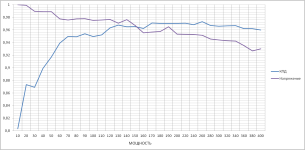The power supply is quite primitive. The TL494 driver controls the FET power stage and synchronous rectifier via TGR. An LNK306 converter is added to power the driver on the high side.
Additional functions: soft start, current protection high voltage transistors, over-temperature protection, latch-off by external signal, STBY signal generation for the load.
Increased capacitance of capacitors on the high side, ZVS/ZCS mode in almost the entire power range.
The transformer is wound with ordinary wire, no gap in the core. Because of this, the transformer fabrication is very simple. Three industrial transformers of .3$ each are used to control the gates.
The main disadvantage of the product is a very high peak current at startup, if 10mF of additional capacitance is connected to the output, it will be difficult to adjust the protection.
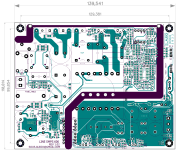
![20230914_132747[1].jpg 20230914_132747[1].jpg](https://www.diyaudio.com/community/data/attachments/1120/1120944-f125984bcb29ec60c0f038eb9f90f39a.jpg?hash=8SWYS8sp7G)
Additional functions: soft start, current protection high voltage transistors, over-temperature protection, latch-off by external signal, STBY signal generation for the load.
Increased capacitance of capacitors on the high side, ZVS/ZCS mode in almost the entire power range.
The transformer is wound with ordinary wire, no gap in the core. Because of this, the transformer fabrication is very simple. Three industrial transformers of .3$ each are used to control the gates.
The main disadvantage of the product is a very high peak current at startup, if 10mF of additional capacitance is connected to the output, it will be difficult to adjust the protection.

![20230914_132747[1].jpg 20230914_132747[1].jpg](https://www.diyaudio.com/community/data/attachments/1120/1120944-f125984bcb29ec60c0f038eb9f90f39a.jpg?hash=8SWYS8sp7G)
Attachments
Last edited:
Does not look really simple to me. A single schematic sheet would be easier to trace. btw - is there any kind of regulation?
Transformer heat-up maybe reduced by using litz-wire - on the other hand average power consumption with real life class-d-amps will be much lower.
Looks a bit like LLC to me. To make this work over the full load range, the transformer core requires an air gap.
Concerning start-up in-rush currents: Is there any overcurrent protection on the primary side? LLC series resonant tank allows extreme high primary current in case of discharged secondary bulk caps.
A while ago a created this unregulated 400W-LLC-converter with secondary sync rectification:
Transformer heat-up maybe reduced by using litz-wire - on the other hand average power consumption with real life class-d-amps will be much lower.
Looks a bit like LLC to me. To make this work over the full load range, the transformer core requires an air gap.
Concerning start-up in-rush currents: Is there any overcurrent protection on the primary side? LLC series resonant tank allows extreme high primary current in case of discharged secondary bulk caps.
A while ago a created this unregulated 400W-LLC-converter with secondary sync rectification:
Attachments
In our case, bidirectional rectifier, some complication because of this.
300W RMS corresponds to a music load of 1.2kW. The secondary windings are only 2x0.8mm dia. It is possible to make the cross section larger, but there is no advantage in this form factor.
LLC is a good topology, but it is difficult to make a transformer. By good, for audio requires bifilar winding of output windings, and necessarily litz wire, which is easy to realize in single products, but mass production is too expensive + variation of Ls parameters.
In our case ZVS+ZCS is supported without transformer "twists". The only advantage of LLC is more flexible current protection. But losses are higher.
Power supply is far from ideal, I agree 😉.
300W RMS corresponds to a music load of 1.2kW. The secondary windings are only 2x0.8mm dia. It is possible to make the cross section larger, but there is no advantage in this form factor.
LLC is a good topology, but it is difficult to make a transformer. By good, for audio requires bifilar winding of output windings, and necessarily litz wire, which is easy to realize in single products, but mass production is too expensive + variation of Ls parameters.
In our case ZVS+ZCS is supported without transformer "twists". The only advantage of LLC is more flexible current protection. But losses are higher.
Power supply is far from ideal, I agree 😉.
